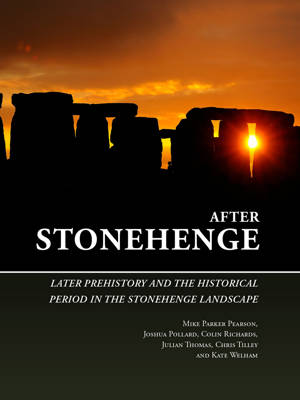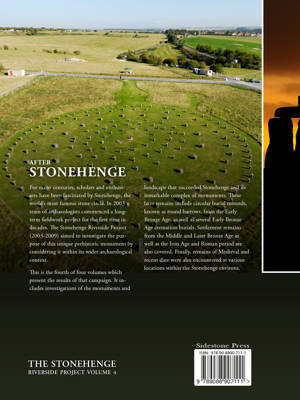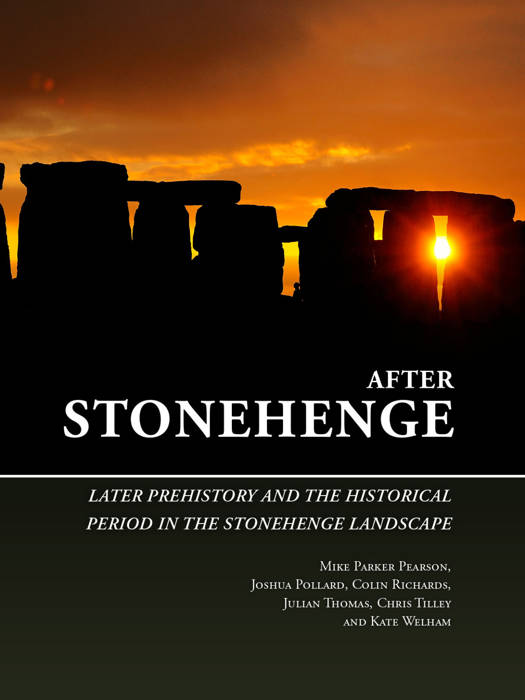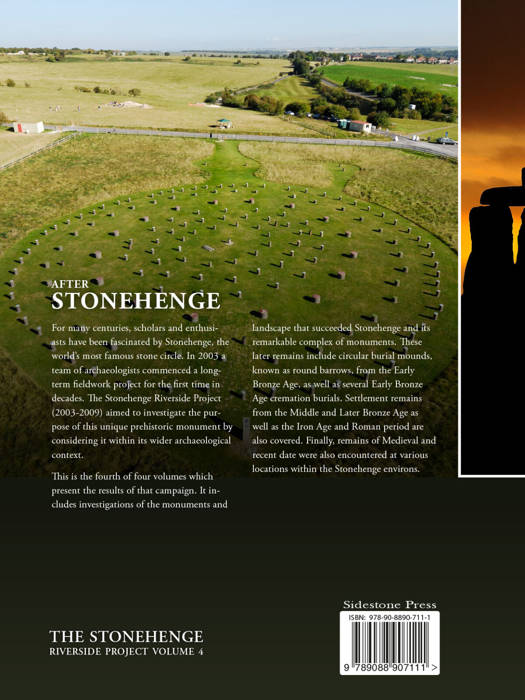
Wil je zeker zijn dat je cadeautjes op tijd onder de kerstboom liggen? Onze winkels ontvangen jou met open armen. Nu met extra openingsuren op zondag!
- Afhalen na 1 uur in een winkel met voorraad
- Gratis thuislevering in België vanaf € 30
- Ruim aanbod met 7 miljoen producten
Wil je zeker zijn dat je cadeautjes op tijd onder de kerstboom liggen? Onze winkels ontvangen jou met open armen. Nu met extra openingsuren op zondag!
- Afhalen na 1 uur in een winkel met voorraad
- Gratis thuislevering in België vanaf € 30
- Ruim aanbod met 7 miljoen producten
Zoeken


After Stonehenge
Later prehistory and the historical period in the Stonehenge landscape
Mike Parker Pearson, Joshua Pollard, Colin Richards, Julian Thomas
€ 34,95
+ 69 punten
Uitvoering
Omschrijving
For many centuries, scholars and enthusiasts have been fascinated by Stonehenge, the world's most famous stone circle. In 2003 a team of archaeologists commenced a long-term fieldwork project for the first time in decades. The Stonehenge Riverside Project (2003-2009) aimed to investigate the purpose of this unique prehistoric monument by considering it within its wider archaeological context.
This is the fourth of four volumes which present the results of that campaign. It includes investigations of the monuments and landscape that succeeded Stonehenge and its remarkable complex of monuments. These later remains include circular burial mounds, known as round barrows, from the Early Bronze Age, as well as several Early Bronze Age cremation burials. Settlement remains from the Middle and Later Bronze Age as well as the Iron Age and Roman period are also covered. Finally, remains of Medieval and recent date were also encountered at various locations within the Stonehenge environs.
Contents:
LIST OF FIGURES
LIST OF TABLES
CONTRIBUTORS
PREFACE
ACKNOWLEDGEMENTS
1. Stonehenge and its round barrows
Round barrows in the landscape - (C. Tilley & W. Bennett)
Round barrows south of Woodhenge - (J. Pollard, D. Robinson & A. Pike)
The Bulford round barrow and cremated deposit - (C. Richards)
Grave goods from the Bulford barrow: chalk, stone, flint, crystal, worked bone - (J. Pollard, B. Chan, F. Roe)
The Cuckoo Stone cremated deposits - (C. Richards)
Bronze Age and later prehistoric pottery from the Cuckoo Stone - (A. Woodward)
Cremated human bones from the Cuckoo Stone and Bulford Early Bronze Age burials - (C. Cox Willis)
Lithics from Roman contexts at the Cuckoo Stone - (B. Chan)
2. The Bronze Age enclosure of Stonehenge's landscape
The Stonehenge Palisade - (P. Garwood, J. Pollard)
The chalk pig from the Palisade - (A. Teather)
Bronze Age and later prehistoric pottery from the Palisade ditch - (A. Woodward)
Human bones from Iron Age deposits in the Palisade Ditch - (C. Cox Willis)
The Gate Ditch - (D. Robinson & O. Bayer)
Bronze Age and later prehistoric pottery from Amesbury 42 barrow, Bluestonehenge, Woodhenge, South of Woodhenge and Durrington Walls - (A. Woodward)
Lithics from the ploughsoil at the Palisade, South of Woodhenge and Durrington Walls (South Entrance) - (D. Mitcham)
Lithics from stratified contexts at the Palisade, Larkhill, West Amesbury (Bronze Age), South of Woodhenge and Durrington Walls (West Entrance) - (B. Chan)
Land boundaries after Stonehenge - (J. Pollard & P. Garwood)
3. Iron Age, Roman and later activity at Durrington Walls and environs
The Middle Iron Age settlement at Durrington: east entrance, interior and west entrance - (M. Parker Pearson, J. Pollard & J. Rylatt)
The Cuckoo Stone Roman building and burial - (C. Richards)
Roman pottery from the Cuckoo Stone, the Palisade, Amesbury 42 barrow, Larkhill, Aubrey Hole 7, Bluestonehenge, Woodhenge, South of Woodhenge and Durrington Walls - (D. Stansbie)
Roman coins from the Cuckoo Stone and south of Durrington Walls - (R. Reece)
Human bones from the Roman cemetery south of Woodhenge - (J. Hawcroft)
Post-Medieval quarrying at Durrington Walls - (M. Parker Pearson)
Later activity at Durrington Walls riverside - (J. Pollard)
4. West Amesbury medieval village
Medieval and post-Medieval pits and ditches at West Amesbury - (M. Parker Pearson)
Medieval pottery from West Amesbury - (D. Brown)
Human bones from a possible Saxon cemetery at West Amesbury - (A. Chamberlain)
5. Twentieth-century archaeology
Larkhill Army Camp - (J. Pollard)
Geophysics - (K. Welham)
Durrington west entrance WW1 deposits - (J. Rylatt & M. Brown)
The archaeology of archaeologists - re-excavating Cunnington, Hawley and Atkinson - (M. Parker Pearson et al.)
6. Environmental evidence and faunal remains
Land mollusca - (M. Allen)
Carbonised plant remains from the Palisade and West Amesbury - (E. Simmons)
Animal bones from the Cuckoo Stone, the Stonehenge Palisade, South of Woodhenge, Amesbury Riverside - (C.Minniti, U. Albarella & S. Viner)
7. Stonehenge: its architecture and its landscape: a reanalysis
C. Tilley, C. Richards, W. Bennett and D. Field
8. After Stonehenge: an overview
J. Pollard et al.
This is the fourth of four volumes which present the results of that campaign. It includes investigations of the monuments and landscape that succeeded Stonehenge and its remarkable complex of monuments. These later remains include circular burial mounds, known as round barrows, from the Early Bronze Age, as well as several Early Bronze Age cremation burials. Settlement remains from the Middle and Later Bronze Age as well as the Iron Age and Roman period are also covered. Finally, remains of Medieval and recent date were also encountered at various locations within the Stonehenge environs.
Contents:
LIST OF FIGURES
LIST OF TABLES
CONTRIBUTORS
PREFACE
ACKNOWLEDGEMENTS
1. Stonehenge and its round barrows
Round barrows in the landscape - (C. Tilley & W. Bennett)
Round barrows south of Woodhenge - (J. Pollard, D. Robinson & A. Pike)
The Bulford round barrow and cremated deposit - (C. Richards)
Grave goods from the Bulford barrow: chalk, stone, flint, crystal, worked bone - (J. Pollard, B. Chan, F. Roe)
The Cuckoo Stone cremated deposits - (C. Richards)
Bronze Age and later prehistoric pottery from the Cuckoo Stone - (A. Woodward)
Cremated human bones from the Cuckoo Stone and Bulford Early Bronze Age burials - (C. Cox Willis)
Lithics from Roman contexts at the Cuckoo Stone - (B. Chan)
2. The Bronze Age enclosure of Stonehenge's landscape
The Stonehenge Palisade - (P. Garwood, J. Pollard)
The chalk pig from the Palisade - (A. Teather)
Bronze Age and later prehistoric pottery from the Palisade ditch - (A. Woodward)
Human bones from Iron Age deposits in the Palisade Ditch - (C. Cox Willis)
The Gate Ditch - (D. Robinson & O. Bayer)
Bronze Age and later prehistoric pottery from Amesbury 42 barrow, Bluestonehenge, Woodhenge, South of Woodhenge and Durrington Walls - (A. Woodward)
Lithics from the ploughsoil at the Palisade, South of Woodhenge and Durrington Walls (South Entrance) - (D. Mitcham)
Lithics from stratified contexts at the Palisade, Larkhill, West Amesbury (Bronze Age), South of Woodhenge and Durrington Walls (West Entrance) - (B. Chan)
Land boundaries after Stonehenge - (J. Pollard & P. Garwood)
3. Iron Age, Roman and later activity at Durrington Walls and environs
The Middle Iron Age settlement at Durrington: east entrance, interior and west entrance - (M. Parker Pearson, J. Pollard & J. Rylatt)
The Cuckoo Stone Roman building and burial - (C. Richards)
Roman pottery from the Cuckoo Stone, the Palisade, Amesbury 42 barrow, Larkhill, Aubrey Hole 7, Bluestonehenge, Woodhenge, South of Woodhenge and Durrington Walls - (D. Stansbie)
Roman coins from the Cuckoo Stone and south of Durrington Walls - (R. Reece)
Human bones from the Roman cemetery south of Woodhenge - (J. Hawcroft)
Post-Medieval quarrying at Durrington Walls - (M. Parker Pearson)
Later activity at Durrington Walls riverside - (J. Pollard)
4. West Amesbury medieval village
Medieval and post-Medieval pits and ditches at West Amesbury - (M. Parker Pearson)
Medieval pottery from West Amesbury - (D. Brown)
Human bones from a possible Saxon cemetery at West Amesbury - (A. Chamberlain)
5. Twentieth-century archaeology
Larkhill Army Camp - (J. Pollard)
Geophysics - (K. Welham)
Durrington west entrance WW1 deposits - (J. Rylatt & M. Brown)
The archaeology of archaeologists - re-excavating Cunnington, Hawley and Atkinson - (M. Parker Pearson et al.)
6. Environmental evidence and faunal remains
Land mollusca - (M. Allen)
Carbonised plant remains from the Palisade and West Amesbury - (E. Simmons)
Animal bones from the Cuckoo Stone, the Stonehenge Palisade, South of Woodhenge, Amesbury Riverside - (C.Minniti, U. Albarella & S. Viner)
7. Stonehenge: its architecture and its landscape: a reanalysis
C. Tilley, C. Richards, W. Bennett and D. Field
8. After Stonehenge: an overview
J. Pollard et al.
Specificaties
Betrokkenen
- Auteur(s):
- Uitgeverij:
Inhoud
- Aantal bladzijden:
- 275
- Taal:
- Engels
- Reeks:
- Reeksnummer:
- nr. 4
- Geïllustreerd:
- Ja
Eigenschappen
- Productcode (EAN):
- 9789088907111
- Verschijningsdatum:
- 25/02/2022
- Uitvoering:
- Paperback

Alleen bij Standaard Boekhandel
+ 69 punten op je klantenkaart van Standaard Boekhandel
Beoordelingen
We publiceren alleen reviews die voldoen aan de voorwaarden voor reviews. Bekijk onze voorwaarden voor reviews.












